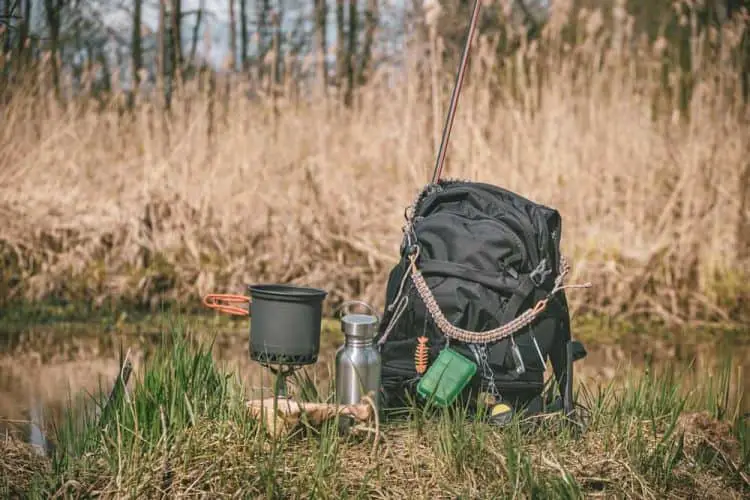Hiking is an activity that people of all ages and skill sets can enjoy. It can be a precursor to a camping trip as well.
Best of all, you can opt between short hour-long hikes and longer treks with one notable difference – packing enough food to fuel you through the day. Here’s where our guide on how to hike with eggs come in handy.
Not only are eggs a valuable source of protein, they’re also comfort foods that remind you of home. They’re the foundation for a healthy hiking diet.
Of course, some questions arise. What eggs are the best kinds of eggs when hiking? How should they be stored without leakage? What’s the best way to preserve eggs longer? How do we flavor and cook them?
From preservation tricks to knowing how to properly carry and transport eggs when hiking, we have all the answers for you. Hiking with eggs is easier than you think!
Let’s dive in!
Table of ContentsThe Benefits Of Eggs For HikersWhat Kind Of Eggs Should You Take Hiking?Fried Or ScrambledBoiledPowdered, dehydrated eggs VS cooked eggsRaw eggsStoring And Transporting Eggs In Your Backpack (Insider Tips And Tricks)3 Tasty Trail-friendly Recipes For Egg Lovers#1 French Toast#2 Brekkie Scramble#3 Potato & Egg MashConclusion
The Benefits Of Eggs For Hikers
Before we get into the different types of eggs and proper carrying methods, you might wonder why eggs are so valuable for hikers and backpackers.
Simply put, eggs are a healthy source of energy.
A single large egg carries 6.28 grams of protein. That’s 13 grams of protein per every 100 grams of egg.
Seeing as the recommended amount of protein is 0.8 g/per kg of body weight, it is a generous source. Offering fat, protein and carbs, eggs are highly satiable (high calorie-to-weight ratio).
Eggs are versatile foods too! For instance, boiled eggs are handy because they are fast to make and can be stored as no-cook food. Not to mention that eggs are appropriate for most vegetarian hikers or those on a keto diet.
What Kind Of Eggs Should You Take Hiking?
As you know, eggs come in all forms, so make sure you choose the type that suits:
Remember that anything you pack, eggs included, should be tailored to the hike you’re embarking on. Let’s look at what type of eggs is easy to carry.
Fried Or Scrambled
Precooked fried and scrambled eggs are sound options for your first and second day on the trail – anything beyond that and your eggs would probably have gone bad.
To ensure that it stores well, make sure your eggs are well done. You don’t want over easy eggs or leave any parts of the yolk uncooked. That’s a recipe for a stomachache and a mess.
After cooking your fried or scrambled eggs longer than usual, you’ll find them easy to store in Zip-lock bags. They’re best for shorter one to two-day day hikes.
Boiled
Pre-trip hard-boiled eggs are perhaps the most convenient way of carrying eggs. Not only are they ready to eat any time, they can also last a good 3 to 5 days outside the fridge.
Resupplying in the middle of a long hike? Boiling eggs minimizes mess as they don’t stick to cooking pots.
The key to carrying hard-boiled eggs is keeping the shell intact. Once the eggs get exposed to air, they aren’t good to last past two days, so make sure they’re sealed in airtight.
Powdered, dehydrated eggs VS cooked eggs
If you’re an avid hiker like me, you know the value of dehydrated food. An alternative to cooked eggs are powdered and dehydrated eggs – something many outdoor stores now have in stock! These eggs are the most suitable for longer hikes.
Watch the video below that describes how to dehydrate eggs yourself!
The pros are straightforward: they’re less fragile, lightweight, and take up minimized space. You don’t have to worry about cracking or squishing them. Storage is also flexible.
On the other hand, some people feel that these eggs are stripped of taste. They’re also rarely available in supermarkets, meaning you have to go to an outdoor store or order them online.
Raw eggs
Fresh raw eggs may taste the best, but they’re also the most challenging to carry. Not only are they delicate, they won’t last more than a few hours out of the fridge unless you buy them straight off a farm.
You could crack the eggs and just take the egg whites, which extends its “safe to eat” time. That said, we don’t recommend any form of raw eggs if you’re hiking for over two days. Make sure to take a sniff before cooking to check if it has gone bad.
Generally, raw eggs go bad in a few hours while precooked eggs can last between 2 to 5 days. They also require more careful packaging.
Storing And Transporting Eggs In Your Backpack (Insider Tips And Tricks)
So how do we properly pack, carry, and transport eggs? The most common storage options are:
- Zip-lock bag – Flexible and light-weight, these are best if you have to compromise on space. On the downside, its malleable form means your eggs can be squashed.
- Lock-top hard plastic container – Acting as both storage and eating bowl, it also protects your belongings from any leakage.
- Hard plastic water bottle – When filled with uncooked rice or salt water (to add cushion; not draw salt out from the egg) it is a great egg carrier that can also be used as a mixing bowl.
- Cooking kit padded with paper towels or tea towels
- Special egg carriers – A secure casing for eggs but not 100% crack proof!
While precooked eggs are relatively mess free, be careful when storing them into your backpack.
I recommend putting them at the top of the pack or inside structured items (like your cooking kit) to prevent unwanted accidents.
Here are some other tips we’ve picked up when hiking with eggs:
- Don’t wash your eggs. Washing eggs removes its natural protective layer, allowing air to permeate the shell. If you’re in a country where egg shells are washed before going onto the shelves, substitute the layer with fat, bacon grease or coconut oil. It’ll last longer outside the fridge.
- If you’re boiling your eggs pre-hike, start with cold water. In that way you will preserve the protective layer.
- Try Guinea Hen eggs! Our hiking friends on various social media platforms explain that these egg shells are triple times thicker than normal chicken eggs and with richer taste.
- Make sure you get all the air out of your Zip-lock bags or it might pop inside your pack.
- Choose bottles with a wide mouth for easier access.
- If you’re padding up bottles and containers, use dehydrated rice or salt water.
- Refrigerated eggs have a shorter shelf life than fresh eggs – go fresh when possible.
Now let’s jump to the yummy part.
3 Tasty Trail-friendly Recipes For Egg Lovers
Here are three delicious eggs recipes that are trail-friendly!
#1 French Toast
For a yield of 4 servings/8 toasts you need:
- 5 dehydrated powdered eggs
- 8 pieces of bread
- 3 tablespoons of cooking oil
- A generous swipe of butter
- ½ cup of maple syrup (optional)
Rehydrate your Zip-lock bag eggs directly using 5 tablespoons of water. Make sure it’s evenly rehydrated.
Add more water if needed. Dip toast into your egg mixture and fry on a skillet over medium-high heat.
Make sure you coat the skillet with oil. Once browned, remove and eat with butter and syrup.
#2 Brekkie Scramble
In just 15 minutes, enjoy a nutritious breakfast! You’ll need:
- ¾ cup of dehydrated eggs/raw egg mixture
- ½ cup of chopped peppers
- ½ cup of dehydrated spinach
- ½ teaspoon of garlic powder
- Salt & pepper (to flavor)
- 1 tablespoon olive oil
- 1 ¼ cup of water
Add all the spices, spinach and peppers into your Zip-lock or container of egg mixture. Add water if the eggs are dehydrated; mix thoroughly so there are no lumps and everything is mixed well.
Even small kids know that brekkie scramble is good!
Heat oil in cook pan on low heat. Dump mixture in, scramble and then dig in. That dish is super mouth-watering! Now lie in your hammock and enjoy that tasty meal!
#3 Potato & Egg Mash
As a meat lover, that’s my favorite:
- 1 ¾ cup of instant mashed potatoes
- ½ cup of eggs & bacon mixture
- 1 tablespoon of dry milk
- Cheddar cheese (optional)
Simply combine all the ingredients and add water if too dry. Tip into pan and cook or dump Zip-lock into pot of heated water and let it cook slowly.
Conclusion
Whether you decide on dehydrated, boiled, pre-cooked fried, fresh or scrambled eggs, just be mindful about how long they can last.
Remember to test out your storage options before your hike, too. It’s best to check that the Zip-locks, containers, and bottles aren’t leaking.
Worried that your eggs won’t taste good? All you need are some spices. We’ve sprinkled on the usual salt, pepper, and garlic powder to great success.
Eggs are some of the best foods to bring on a hike – you just need to know how to carry it properly. After all, we need sufficient energy to keep our bodies moving!
Do you bring eggs on your hikes? Leave a comment below and share your experience!
Asen Stoyanchev
Founder of this website, Asen is a passionate hiker and writer who is also a gear nerd. He’s been featured on many established hiking websites where he gives hiking advice & tips. When he is not trekking with his family or friends, he is writing articles and product reviews. Asen spends most of his time in Bulgaria but he constantly travels the world in seek of more unforgettable experiences. Read more about Asen here.
Ten articles before and after
The Parts Of A Tent Explained (Dead-Easy And Stupid-Simple)
What Is The Best Backpacking Snow Shovel Of 2021? See It
8 Durable Hiking Pants With Reinforced Knees Reviewed [2021]
Why Does Blowing On A Fire Make It Burn Better? [See Why]
What To Use As A Pillow When Camping? [10 Comfy Options]
The 8 Best Winter Hiking Hats According To Top Experts [2021]
7 Premium Extra Large Hiking Backpacks Reviewed [2021]
13 Best Hiking Gadgets That Are Ridiculously Popular (2021)










 Mobile/What's App/Wechat
Mobile/What's App/Wechat E-Mail
E-Mail ADD
ADD




